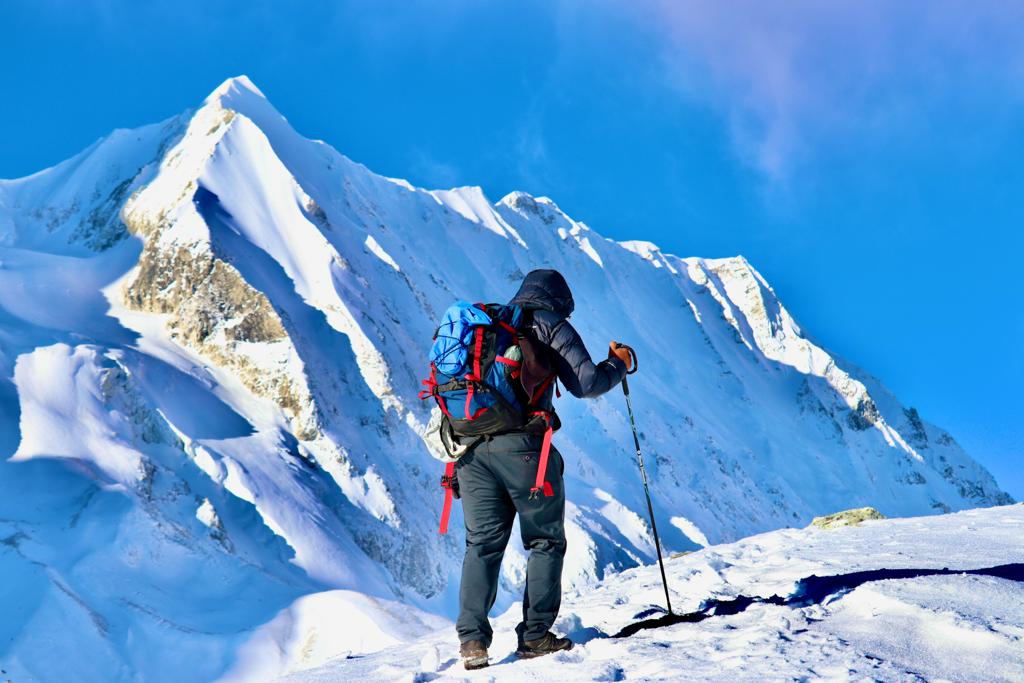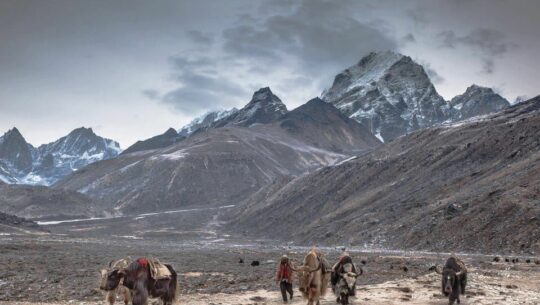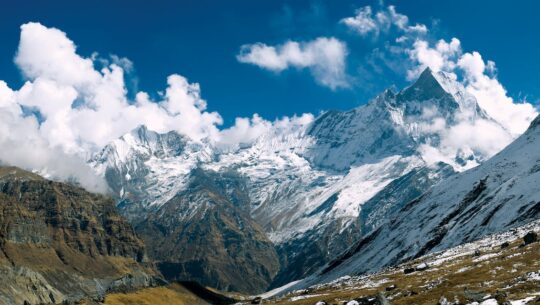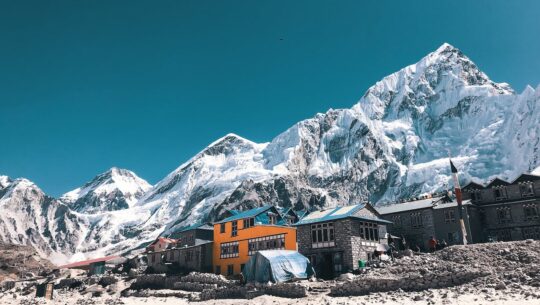Manaslu Circuit Trek- 14 days: A Sacred Himalayan Journey
14 Days
Moderate to Challenging
5,160 meters Larkya La Pass
Teahouses/Lodges
Private Jeep sectional transport from Kathmandu to Machha Khola and Dharapani–Kathmandu.
2 - 12
March to May and September to November
Manaslu Circuit Trek- 14 days: A Sacred Himalayan Journey Introduction
“A perfectly balanced journey through the majesty of the Himalaya — where altitude meets acclimatization, and culture meets landscape.”
The Manaslu Circuit Trek is a stunning loop around Nepal’s eighth-highest peak, Mt. Manaslu (8,163m). This less-frequented route combines rugged wilderness, high mountain passes, and genuine Tibetan Buddhist culture. Trekkers move from lush river valleys to the difficult Larkya La Pass at 5,160m. They enjoy raw natural beauty and visit remote villages that time has left untouched. It is perfect for adventurers looking for solitude, cultural experiences, and spectacular views of the Himalayas away from the crowds.
Who is This Trek For?
This trek is designed for:
Trekkers looking to challenge themselves with more remote and demanding trails, building off prior experience.
Exploratory adventure enthusiasts seeking to wander off the beaten path into hidden pockets of the Himalayas.
Guests who appreciate hands-on cultural immersion along with a homestay-style lodging.
Solitary nature lovers yearning for unrefined mountain wilderness.
Physically fit and mentally steeled persons are willing to contend with long walking days and high altitudes.
Highlights
Embark on the circuit trek of Manaslu, the eighth highest mountain in the world (8,163 meters).
Panoramic views of Himlung, Cheo Himal, Kang Guru and Annapurna II can be seen from Larkya La Pass at 5,160 meters.
Visit Buddhist villages like Lho, Samagaun, and Samd,o which is famed for its relics and culture.
Enjoy trekking through exotic landscapes including: subtropical forests with terraced hills, alpine meadows alongside glacial valleys.
Limited access to restricted areas allows trekkers to enjoy fewer crowds along this trail.
Visit ancient monasteries like Ribung Gompa and Pungyen Gompa.
Observe Himalayan wildlife such as blue sheep, Himalayan Thar goats, and even snow leopards.
Receive hospitable traditional mountain life in remote areas.
Explore where two conservation areas intersect: Manaslu and Annapurna.
Outline Itinerary
- Day 1: Drive to Soti Khola (710m) from Kathmandu
- Day 2: Trek to Machha Khola (900m)
- Day 3: Trek to Jagat (1,340m)
- Day 4: Trek to Deng (1,860m)
- Day 5: Trek to Namrung (2,630m)
- Day 6: Trek to Lho (3,180m)
- Day 6: Trek to Lho (3180m)
- Day 7: Trek to Samagaon (3530m)
- Day 8: Acclimatization Day in Samagaon
- Day 9: Trek to Samdo (3875m)
- Day 10: Trek to Dharamsala / Larkya Phedi (4460m)
- Day 11: Cross Larkya La Pass (5160m), Trek to Bimthang (3720m)
- Day 12: Trek to Tilije (2,300m)
- Day 13: Trek to Dharapani (1,960m), Drive to Besisahar
- Day 14: Drive back to Kathmandu
Detailed Itinerary
Day 1: Drive to Soti Khola (710m) from Kathmandu
Driving Time: 8–9 hours
A lengthy yet very scenic ride in a westerly direction, predominantly following the banks of rivers and terraced hills. You will drive through the town of Arughat and arrive in the small but beautiful village of Soti Khola, resting alongside the Budhi Gandaki River.
Day 2: Trek to Machha Khola (900m)
Trekking Time: 6–7 hours
Cross suspension bridges, follow riverside trails, and trek through the forests. Look for monkeys, traverse Lapubesi, and eventually, arrive at your destination, Machha Khola; another peaceful village.
Day 3: Trek to Jagat (1,340m)
Trekking Time: 6–7 hours
The trail continues to Khorlabesi, naturally a hot spring at Tatopani, and then to Jagat, where you must check in. A village with slate-paved streets, jagged mountains, and mani walls.
Day 4: Trek to Deng (1,860m)
Trekking Time: 6–7 hours
Recovering from the high point of Khorlabesi (or hot springs), so you can pass through Ekle Bhatti, taking a few suspension bridges, marveling at the cold waterfall coming from the forested canyon below, and arriving mid-to-late afternoon to Deng on the banks of Budhi Gandaki.
Day 5: Trek to Namrung (2,630m)
Trekking Time: 6–7 hours
Today, you will ascend through Makalu rhododendrons and prayer flags on your way to Namrung. You obey whatever karma is left before entering this small Buddhist village offering the first good views of Ganesh Himal and Himal Chuli.
Day 6: Trek to Lho (3,180m)
Trekking Time: 4–5 hours
Today, you will continue your ever-steady climb through barley fields and centuries-old chortens to Lho a few miles ahead. Before adding your stamp to the Manaslu trek,
Day 6: Trek to Lho (3180m)
Trek Duration: 4–5 hours
Continue a steady climb through barley fields and aged chortens. Reach Lho, an authentic Tibetan village with views of Manaslu (8163m) and the monumental Ribung Gompa.
Day 7: Trek to Samagaon (3530m)
Trek Duration: 4–5 hours
Wander through delightful alpine meadows and monasteries. Arrive at Samagaon, snuggled beneath glacial ski-mountains and surrounded by mani walls, prayer flags, and yak herders.
Day 8: Acclimatization Day in Samagaon
Explore, rest, and adapt to the altitude.
Options:
Hike visiting Manaslu Base Camp (4800m)
Hike visiting Pungyen Gompa with stunning panoramic views of the Himalayas
Explore ancient Tibetan-style houses and monasteries
Day 9: Trek to Samdo (3875m)
Trek Duration: 4–5 hours
A short trek through yak pastures, glacial rivers, and windy ridges. Arrive at Samdo, a remote outpost on the last leg of your journey to Tibet, infused with a raw mountain energy.
Day 10: Trek to Dharamsala / Larkya Phedi (4460m)
Trek Duration: 4–5 hours
A gentle rising trek to your final stop before the pass. Extend your walkers twigs that give warmth and comfort for the night. Now is when things will get serious.
Day 11: Cross Larkya La Pass (5160m), Trek to Bimthang (3720m)
Trek Duration: 8–9 hours
An exhausting, rewarding day — cross the chilly Larkya La Pass with views of Cheo
Day 12: Trek to Tilije (2,300m)
Trek Time: 5-6 hours
Descend slowly through rhododendron forests and alpine pastures. Finally reach Tilije, a Gurung village with famous apple orchards and stone houses.
Day 13: Trek to Dharapani (1,960m), Drive to Besisahar
Trek Time: 3-4 hours
Walk to Dharapani, where the Manaslu route rejoins with the Annapurna Circuit. Enjoy a scenic jeep ride through a rugged route to Besisahar.
Day 14: Drive back to Kathmandu
Drive Time: 6-7 hours
Head north back to the capital. You will have finished your highland loop — tired feet, a full heart, and permanent memories in good high-altitude air.
Includes
- All required trekking permits: Manaslu Restricted Area Permit, MCAP, and ACAP
- Two nights’ accommodation in Kathmandu at a 3-star hotel, including breakfast
- Private transportation by jeep from Kathmandu to Machha Khola and from Dharapani back to Kathmandu
- Eleven nights’ accommodation at local teahouses during the trek
- Breakfast, lunch, and dinner (all meals) during the trek
- Licensed English-speaking guide for the trek issued by government authorities
- One porter per two trekkers up to 20 kg combined weightMedical aid grade first-aid supplies, along with a pulse oximeter for monitoring key vitals related to altitude sicknessTrek-specific first-aid kit
- Along with the necessary local taxes, all the generic paperwork needed is provided.
- Trekking map alongside a branded duffel bag from Himalayan Trek Ventures.
- Arrangement of emergency evacuation (if necessary; excluded insurance).
Excludes
- Booking an international flight and obtaining a visa to enter Nepal
- Except for breakfast at the hotel, lunch and dinner are provided in Kathmandu.
- Employee clothing and personal gear for hiking
- Emergency evacuation services are covered by travel insurance.
- Additional expenses will be incurred during the mountain trek for things like refreshments, snacks, hot water service, showers, and battery recharge.
- gratuity, which includes tips for a porter’s guide services.
- Optional extras: Renting extra horses or porters.
Trip Map
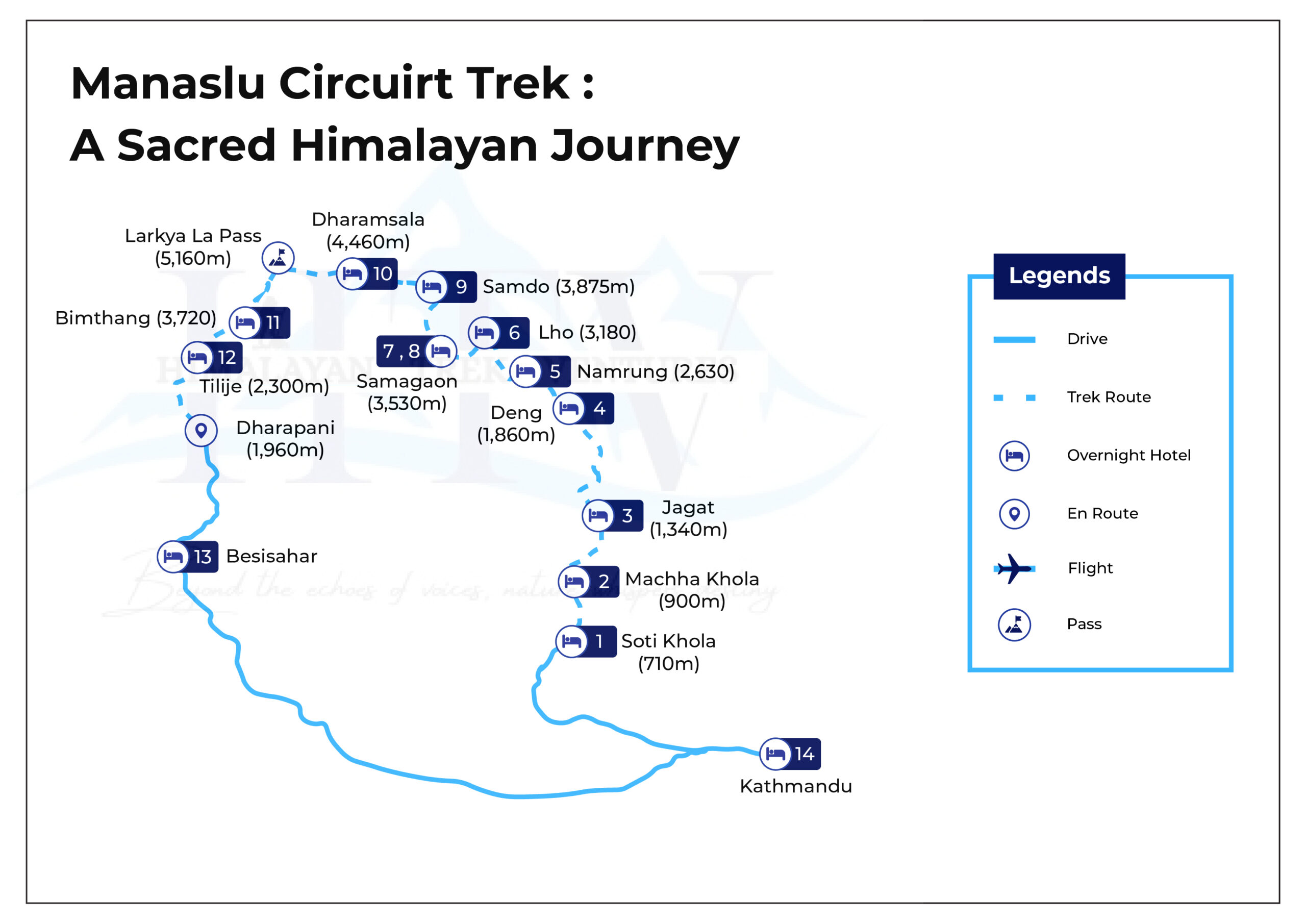
Important Information
The trek starts in a restricted area that requires special permissions. Permits are only granted to a minimum of two passengers who have made reservations through authorised agencies.
Regardless of fitness level, altitude sickness can strike any hiker; therefore, the itinerary includes adequate acclimatisation.
Most villages have electricity, but there are frequent power outages and few charging stations.
There are challenging sections on the trail, particularly when traversing the Larkya La Pass.
Above 3,500 meters, it is crucial to be ready for wind, rain, and cold because the weather can change suddenly.
Gear List
- Base layers that wick away moisture (2–3 sets)
- layer of insulation (down jacket or fleece)
- A jacket that is waterproof and windproof (Gore-Tex or comparable)
- Warm thermal trousers and trekking trousers that are waterproof
- Lightweight trekking trousers
- Trekking shirts that breathe (long and short sleeves)
- Sun hat and warm hat
- Buff or neck gaiter
- Gloves: insulated gloves and thin liner gloves
- Liner socks and warm socks (four to five pairs)
- Quick-dry pants
- Footwear
- Waterproof trekking boots (well-worn)
- Sandals or shoes for camp
- Gaiters are optional but helpful in mud or snow.
- Sleeping and Furnishings
- A four-season sleeping bag is advised for temperatures between -15°C and -20°C.
- A sleeping bag liner is optional but improves hygiene and warmth.
- Fast-drying towel
- Headlight with extra batteries
- UV-blocking sunglasses
- Trekking poles are strongly advised.
- Two-litre water bottles and purification tablets or filters
- 30–40L daypack
- Duffle bag (provided by the business)
- Personal belongings and toiletries
- Hand sanitiser, toothbrush, toothpaste, and biodegradable soap
- SPF-30 or higher sunscreen and SPF-containing lip balm
- Toilet paper, feminine hygiene supplies, and wet wipes (if necessary)
- A compact personal medical kit that contains medications for blisters, stomach problems, altitude, etc.
- An eye mask and earplugs
- Copies of permits, passports, and travel insurance documents


